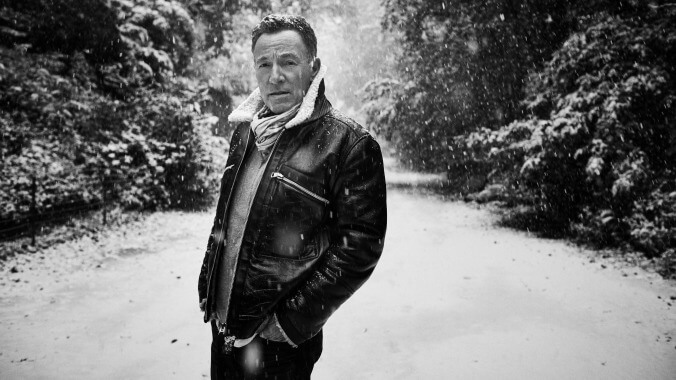Letter To You is one of the finest achievements of Bruce Springsteen’s career

Loss is on Bruce Springsteen’s mind. How could it not be—it’s on all of our minds these days, inescapably present and unfailingly haunting. It greets us each day as we stare down the mounting human cost of this global tragedy, and as we go to bed each night, taking what succor we can from the things and people that bring us comfort. But it’s especially insistent for those of us living in countries that have so spectacularly failed to protect their citizenry, where we continue to see the body count rise and loved ones fall ill. In this one way—this shared sense of communal pain—we are a collective, united in loss and hope for a brighter tomorrow.
And if there’s an artist who has spent his life speaking to lost souls looking for that silver lining in a life of tragedy, it’s Bruce Springsteen. From early tales of young dreamers taking to the open road in search of something better; to mid-period explorations of adults grappling with relationships and dreams of the path not taken; to his latter-day ruminations on life, love, and all of the above, the musician has been striving to connect through stories of absence. Sure, he’s got the occasional love song, but what his music mostly provides is a much-needed stopgap in the cracks of our ongoing facade of a mental dam against the torrent of all that worries us. The Boss straps on his guitar to remind you it’s possible to get through the day, and maybe even end it with a smile on our face; sure, this life can be a shitshow, but we’re all in it together, so let’s find joy, peace, or even transcendence—a reason to believe—where we can. And by that measure—or nearly any other one—his new record Letter To You is an absolute triumph, one that can take its place alongside the best albums of Springsteen’s long career.
Letter To You, Springsteen’s 20th studio album, returns time and again to the idea of loss. Loss of loved ones, loss of hope, or even just the temporary loss of someone you want by your side—it all comes to the forefront in a batch of songs that resonate lyrically and musically, whether through a hushed acoustic pleading, as on album opener “One Minute You’re Here,” or on the grandly epic, lighters-in-the-air bombast of stately seven-minute anthem “Janey Needs A Shooter.” Tying them together, as always, is a fervent belief in the power of music (and yes, a little bit of love) to uplift and provide some respite during these dark times, the kind of revival-tent rock sermonizing that infuses his live shows with hallelujah-level intensity and his albums with recherché energy. And Springsteen, having at long last learned to wield his throaty delivery in just about any way he desires, pairs these various longings and laments to straightforwardly assembled numbers that feel organic in both conception and execution, as though the E Street Band just spent the afternoon jamming out riffs until it found the ideal sound to match the meaning and mood.
What makes Letter To You great can be identified by holding up nearly any track as a microcosm of its overall scope. Take “Ghosts,” the third-to-last song on the album: Reworking the main riff from Tom Petty’s “Freefalling,” this barnburner of a number seems, at first glance, like it shouldn’t work. The structure is pure retro-’50s sock-hop rock and roll, a call and response between Bruce’s vocal lines and an outdated guitar riff—all the hallmarks of a past-its-prime tune. But Springsteen takes it and does what he’s done his entire career: adopt the sounds of rock ’n’ roll’s past, the rhythm-and-blues grooves and melodies of yesteryear, and infuse them with vital new passion and profundity, making what’s old feel new again. Even his increasingly sentimental lyrics feel universal here, rather than hokey. It’s a musical transfiguration that never stops being impressive, no matter how many times he’s pulled it off through the decades.
 Keep scrolling for more great stories.
Keep scrolling for more great stories.
